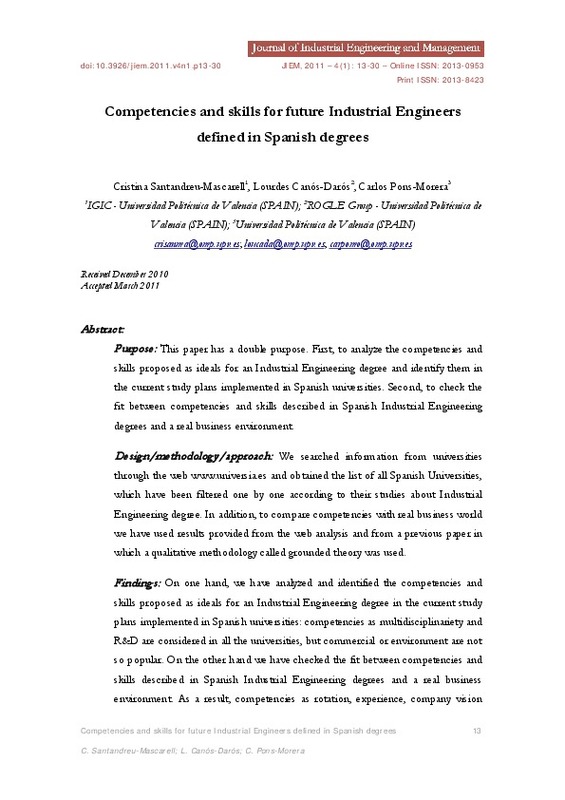JavaScript is disabled for your browser. Some features of this site may not work without it.
Buscar en RiuNet
Listar
Mi cuenta
Estadísticas
Ayuda RiuNet
Admin. UPV
Competencies and skills for future Industrial Engineers defined in Spanish degrees
Mostrar el registro sencillo del ítem
Ficheros en el ítem
| dc.contributor.author | Santandreu Mascarell, Cristina
|
es_ES |
| dc.contributor.author | Canós Darós, Lourdes
|
es_ES |
| dc.contributor.author | Pons Morera, Carlos
|
es_ES |
| dc.date.accessioned | 2013-04-30T14:17:12Z | |
| dc.date.available | 2013-04-30T14:17:12Z | |
| dc.date.issued | 2011 | |
| dc.identifier.issn | 2013-0953 | |
| dc.identifier.uri | http://hdl.handle.net/10251/28361 | |
| dc.description.abstract | [EN] Purpose: This paper has a double purpose. First, to analyze the competencies and skills proposed as ideals for an Industrial Engineering degree and identify them in the current study plans implemented in Spanish universities. Second, to check the fit between competencies and skills described in Spanish Industrial Engineering degrees and a real business environment. Design/methodology/approach: We searched information from universities through the web www.universia.es and obtained the list of all Spanish Universities, which have been filtered one by one according to their studies about Industrial Engineering degree. In addition, to compare competencies with real business world we have used results provided from the web analysis and from a previous paper in which a qualitative methodology called grounded theory was used. Findings: On one hand, we have analyzed and identified the competencies and skills proposed as ideals for an Industrial Engineering degree in the current study plans implemented in Spanish universities: competencies as multidisciplinariety and R&D are considered in all the universities, but commercial or environment are not so popular. On the other hand we have checked the fit between competencies and skills described in Spanish Industrial Engineering degrees and a real business environment. As a result, competencies as rotation, experience, company vision and corporative strategy are in all the analyzed study plans, but competencies as shared vision, free access to information and involvement of managers do not appear in new degrees, but they are required in real business. Research limitations/implications: About the origin of information, we use official web sites belonging to Spanish public and some private universities, and corresponding schools. Some universities have not updated the information about degrees in Industrial Engineering, and they still have old plans information. Moreover, the comparison we can make between the competencies of degrees and the needs to develop the Industrial Engineering profession is theoretical because the introduction of new degrees has just started and there are no graduates. Practical implications: The principal practical implication is to identify a professional profile of the engineer common to most Spanish universities and therefore facilitate the selection of one curricula or another for students. These can lead to check with the first graduates whether or not the competencies acquired in University fit in the business world. On the other hand, from a professional point of view, we open a future line of research by testing competencies acquired by graduates and competencies required in the professional field, as well as the study of these competencies in the professional field. In addition, current employees may decide to recycle their competencies or acquire new ones knowing the design of new degrees. Originality/value: There are no comparative studies about competencies a Spanish Industrial Engineer has to acquire in University to develop his or her professional work. In consequence, there are not comparative studies about competencies acquired in university and profiles demanded by companies in real business world. This paper deals with both topics. | es_ES |
| dc.description.sponsorship | Partially supported with projects TIN2008-06872-C04-02 and PIME-A003/10 from Universidad Politécnica de Valencia. | |
| dc.language | Inglés | es_ES |
| dc.publisher | OmniaScience | es_ES |
| dc.relation.ispartof | Journal of Industrial Engineering and Management | es_ES |
| dc.rights | Reconocimiento - No comercial (by-nc) | es_ES |
| dc.subject | Competencies | es_ES |
| dc.subject | Skills | es_ES |
| dc.subject | Industrial Engineering degree | es_ES |
| dc.subject | Spanish universities | es_ES |
| dc.subject.classification | ECONOMIA FINANCIERA Y CONTABILIDAD | es_ES |
| dc.subject.classification | ORGANIZACION DE EMPRESAS | es_ES |
| dc.title | Competencies and skills for future Industrial Engineers defined in Spanish degrees | es_ES |
| dc.type | Artículo | es_ES |
| dc.identifier.doi | 10.3926/jiem.2011.v4n1.p13-30 | |
| dc.relation.projectID | info:eu-repo/grantAgreement/MICINN//TIN2008-06872-C04-02/ES/SISTEMAS INTELIGENTES PARA TOMAR DECISIONES ECONOMICO-FINANCIERAS BAJO CONDICIONES DE INCERTIDUMBRE/ | es_ES |
| dc.relation.projectID | info:eu-repo/grantAgreement/UPV//PIME-A003%2F10/ | es_ES |
| dc.rights.accessRights | Abierto | es_ES |
| dc.contributor.affiliation | Universitat Politècnica de València. Departamento de Organización de Empresas - Departament d'Organització d'Empreses | es_ES |
| dc.description.bibliographicCitation | Santandreu Mascarell, C.; Canós Darós, L.; Pons Morera, C. (2011). Competencies and skills for future Industrial Engineers defined in Spanish degrees. Journal of Industrial Engineering and Management. 4(1):13-30. https://doi.org/10.3926/jiem.2011.v4n1.p13-30 | es_ES |
| dc.description.accrualMethod | S | es_ES |
| dc.relation.publisherversion | http://dx.doi.org/10.3926/jiem.2011.v4n1.p13-30 | es_ES |
| dc.description.upvformatpinicio | 13 | es_ES |
| dc.description.upvformatpfin | 30 | es_ES |
| dc.type.version | info:eu-repo/semantics/publishedVersion | es_ES |
| dc.description.volume | 4 | |
| dc.description.issue | 1 | |
| dc.relation.senia | 212502 | |
| dc.contributor.funder | Universitat Politècnica de València | |
| dc.contributor.funder | Ministerio de Ciencia e Innovación | es_ES |








